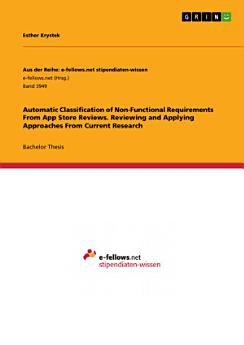Automatic Classification of Non-Functional Requirements From App Store Reviews. Reviewing and Applying Approaches From Current Research
Esther Krystek
2021-ж. сен. · Aus der Reihe: e-fellows.net stipendiaten-wissen 3949-китеп · GRIN Verlag
Электрондук китеп
33
Барактар
family_home
Кошсо болот
info
reportРейтинг жана сын-пикирлер текшерилген жок Кеңири маалымат
Учкай маалымат
Bachelor Thesis from the year 2021 in the subject Business economics - Miscellaneous, grade: 1,3, University of Mannheim, language: English, abstract: The thesis addresses a part of the requirements engineering process (RE), namely the treatment of non-functional requirements. Requirements are commonly divided into functional requirements (FRs) and non-functional requirements (NFRs). NFRs address the non-functional aspects of a system, for example, its user interface. The thesis lays the theoretical background and explores the general nature of NFRs including different taxonomies of NFRs. It then looks closely at NFRs in the context of mobile applications. In their marketplaces, so-called App Stores, users can express their opinion about an app after downloading and using it. Software developers can collect requirements straight from these reviews. This can help them improve their software to meet users' expectations. Due to the vast amount of review data manual inspection is tedious, time-consuming, cumbersome, or even infeasible. Tools to automatically classify such reviews might aid with this problem. However, there is still no solution to automatically extract NFRs from app store reviews and classify them into different types in practice. The thesis, therefore, assesses the current state of research in developing automated solutions to classify NFRs from app store reviews. It analyzes several past approaches to automatically classify NFRs from app store reviews using machine learning and looks at the performance of different algorithms used for these approaches. It states that the so-called Support Vector Machine (SVM) algorithm performed best in the settings analyzed. The second practical part of the thesis then applies this SVM algorithm onto a given dataset with labeled reviews using Python. The reviews are classified into either one of these categories or no category at all: Usability, Dependability, Performance, and Supportability.
Бул электрондук китепти баалаңыз
Оюңуз менен бөлүшүп коюңуз.
Окуу маалыматы
Смартфондор жана планшеттер
Android жана iPad/iPhone үчүн Google Play Китептер колдонмосун орнотуңуз. Ал автоматтык түрдө аккаунтуңуз менен шайкештелип, кайда болбоңуз, онлайнда же оффлайнда окуу мүмкүнчүлүгүн берет.
Ноутбуктар жана компьютерлер
Google Play'ден сатылып алынган аудиокитептерди компьютериңиздин веб браузеринен уга аласыз.
eReaders жана башка түзмөктөр
Kobo eReaders сыяктуу электрондук сыя түзмөктөрүнөн окуу үчүн, файлды жүктөп алып, аны түзмөгүңүзгө өткөрүшүңүз керек. Файлдарды колдоого алынган eReaders'ке өткөрүү үчүн Жардам борборунун нускамаларын аткарыңыз.








